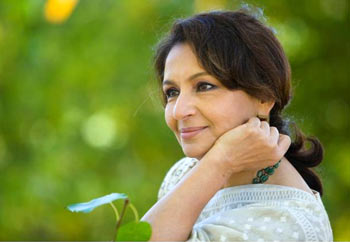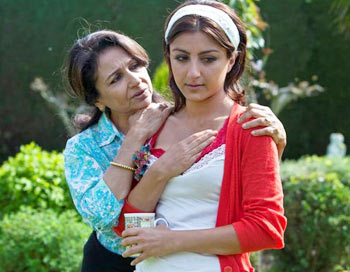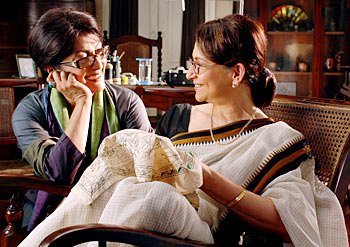
The first thing that appeared familiar about Sharmila Tagore -- as she sat down for an interview -- was her voice. It is the same voice one has heard for years in films like Aradhana, Amar Prem, Mausam, and going back to her first feature, Satyajit Ray's Apur Sansar.
It has matured with age -- she turns 63 in December -- but the tone, the musicality of the voice is the same. A grandmother of two, she arrived for the interview looking glamorous, dressed in jeans, a sky blue sweater with the sleeves pulled back, and a white shirt with stripes.
Tagore made a brief trip to New York to mark the opening of her two films at the Mahendra Indo-American Arts Council Film Festival.
In director Sangeeta Dutta's Life Goes On, Tagore shares screen time with her daughter Soha Ali Khan. It is the first time the two have acted together. She has appeared in two films with her son Saif -- Aashik Aawara (1993) and Eklavya (2007).
In Aniruddha Roy Chowdhury's Antaheen, Tagore appears for the first time with Aparna Sen. Both Sen and Tagore were discovered by Ray, but until now they have never acted together.
Sitting in the mezzanine floor of Hotel Paramount in New York City, Tagore talked to Aseem Chhabra about her two new films, her career and her role as the head of the Indian Film Censor Board.
How did it feel to share screen time with your daughter?
Not much really, because we are all professional actors. Whoever we work with becomes another actor, my co-star. I stop to think that I am the mother. At least I do, I cannot speak for the others.
Except that your comfort level is a bit better when you know that person and you can say let's do it this way. And that is the same if you have been working a very long time with another actor or a director. Otherwise we will be equally selfish, equally giving. But ultimately you curb these feelings and leave it to the director.
Obviously you do not want to upstage. Some people work like that. But I have never been that upstaging kind. I wouldn't want to upset anyone.

You finally acted in a film with Aparna Sen. What was that experience like?
That is a bit of an anti-climax because people have built it up. Actually, we have one scene together. But there is a wonderful chemistry. You feel these two people have known each for a while and the timing is perfect.
Tony's (Chowdhury) film is very good, very contemporary and yet every generation finds something in that film. My point of view comes across in the film because I am older. Aparna is a career person and she is slightly younger. She is pretty much engaged with her work, whereas I am at home, either doing embroidery, cooking, tending to the plants. I'm engaged with life and not really bored. I'm more of an observer, more of a giver and not seeing things only from my point of view. I kind of identified with this film. Although it is a small role, but I've got many SMS'es and phone calls congratulating me about this film.
Why is it important for you to work at this stage in your career with young filmmakers and how do you chose projects?
It's really rewarding working with young people. I used to be very tense about my work. I like to come prepared, but these young people are so relaxed and different. They do not know what they are shooting tomorrow but at the same time they are very professional and creating good work. So I am also learning a lot from them.
I get attracted to projects because of the script or the idea and the basic character. It's not like you say, I need to go to look for work now. No, I don't really want to do so. But when I am facing the camera, from the action sound to cut, it is a magical moment. It's really wonderful.
But having said that, you just don't want to do anything and sometimes fool yourself thinking you are going to do a good film, when you know the net result will be awful. But both these films have satisfied me enormously.

Apur Sansar was made in 1959. You have been in the film business for 50 years. When you look back at your career what are the highlights? What choices did you make that you happy with?
I started with Bengali films, then came to Bombay, and acted in Kashmir Ki Kali and An Evening in Paris. But then I decided that I didn't want the glamour image. So I made it a point to act in films like Aradhana.
I thought that if you are glamorous, that's fine and it works for you. But if you want longevity then you need to do roles that appeal to men and women at the same time. After Aradhana came Amar Prem and later Mausam.
Now when I look back, there is so much good will. It's like you have become a member of somebody's family. And then you are recognised instantly and thanks to television, they resurrected us.
If I had continued to do glamorous roles, then once the time passes it's over for you. Also I had a parallel life, being married at the right time, having children. So any family identifies you with them. They know her life can't be that much different and she can be trusted. To win their trust and goodwill that has been important.
How did it feel when you were being offered mothers' roles?
My first mother's role was in Aradhana. But after that in mid to late 1980s, I was being offered more roles of mothers. In 1991, I played Sarita Choudhury's mother in Mississippi Masala. So at that time I started playing more of a character role. I had already become a mother in my real life.
When you are 35 and are offered mothers' roles, it does bother you. But you need to accept your work field. Youth and beauty doesn't last beyond a point. At 30 you are supposed to be old. You know how it is? Formula kind of things.

You are now living a new chapter in your life -- heading the Censor Board. It's a major responsibility. How did you approach this job? And a lot of people will be critical of your position.
Yes, it is not a popularity contest. But it is my first administrative role and to that extent, I have enjoyed it. It's been a learning process. You work with the ministry on one hand, with the civil society on the other hand, and also we work with the producers. So I am in a position to help.
Can you tell us in what way you have made changes or improved the system? And what has your experience been like working with the government?
We have made a difference that the producers know that there is little more transparency and we are a little more helpful. The synergy is better between the channels. But it is really a ministry run thing. They want to be very hands on and they often do not have the time. So sometimes it can be very frustrating.
What are the issues concerning the Censor Board these days, now that kissing is allowed between men and women?
I think it is political. Anything they might feel will cause a political problem. Any kind of law and order situation because people are quick to take offense. So one has to be always vigilant on those grounds. Not just Hindu, Muslim or Sikh issues. It could be the Naxals or it could be a gender specific or disabled specific. So that kind of sensitivity we have to watch over.
In Onir's new film I Am Omar, Rahul Bose kisses Arjun Mathur. Is kissing between men allowed now?
Male to male kissing at the moment is not even the law. The high court in Delhi has given a decision, but it is on appeal. So homosexuality is not recognised, so it is not the law of the country either. We have allowed a few films with gay themes.
Amol Palekar made a film (The Quest) with a gay theme. Foreign films like Brokeback Mountain opened in India. We had to cut a lot in The Reader. But I do not think that affects the film's tempo or anything too much.
But our country is very different. India is very unique, Indians abroad are very unique. Look at Indian households here, how they stick together, how they do not mix with the mainstream, how they bring up their children. Unhee kaa khana kayengey, unhee ko galee dengey, unhee ko bura sab kaheyngey. Yeh to hota rehta hai.

Do you see a time when India can free itself from a Censor Board?
Once you guys can accept the way we see a woman with naked legs, then only. A foreigner would give just a cursory glance and move on. But we notice more. We need to get over that. We still see women in a particular way and think women shouldn't do certain things.
Now street censorship is more alive. Every Tom, Dick and Harry is going to court and fighting over this and that. Indians have to free themselves from their own censorship and their own mindset.
What would you change in the current censor laws?
We have suggested a lot of things to the ministry. We want four certification categories. We feel there is a huge difference between a 15-year-old and an 18-year-old, and between a 12-year-old and a 15-year-old. You can't put a 15-year-old with a 12-year-old. We do not have a PG13 category as it exists in the US. So there are many things we have tried to introduce. But the government machinery is slow.
Do you have any regrets in your life or career?
I regret that Guru Dutt died so young. I was upset. Why couldn't he have lived a little longer? Why couldn't I have acted with him?
Raj Kapoor signed me for Mera Naam Joker but it never happened. He went with the Russian actress for the circus segment.
Did you want to act in more films with Satyajit Ray?
I acted in five films with him. That was enough. He asked me for Charulata, but then of course he took Madhavi. Then for Ashani Sanket, he took Babita. I could have done better job than Babita. Charulata, I don't regret, because Madhavi did a wonderful job. Then for Ghare Baire I tried very hard to get that role, but he said no.